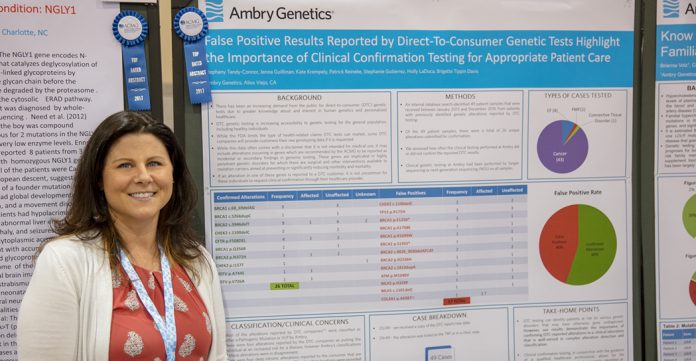
A study by Ambry Genetics researchers showed that as much as 40% of the variants in a variety of genes reported in the raw data of direct-to-consumer (DTC) tests were false positives—a finding that the investigators said raises questions about the accuracy of DTC genetic testing.
The researchers analyzed the raw data of 49 patients who were referred to the clinical diagnostic lab of Ambry Genetics for confirmatory testing of variants previously identified by DTC testing between January 2014 and December 2016.
The patients previously shared with their medical providers the raw data results from tests carried out by DTC testing companies that were not disclosed in the study, False-positive results released by direct-to-consumer genetic tests highlight the importance of clinical confirmation testing for appropriate patient care, published in the journal Genetics in Medicine.
The Ambry researchers found that two out of every five variants noted in the DTC raw data were incorrectly reported and could not be verified by further diagnostic lab tests. In eight instances, according to the study, the variants that were present were misunderstood by third-party interpretation services.
“Such a high rate of a false positives in this particular study was unexpected,” Stephany Leigh Tandy-Connor, MS, CGC, study leader and supervisor, genetic counseling-cancer at Ambry, said in a statement. “While DTC results may lead to healthy changes in lifestyle or diet, these could also result in unwarranted emotions, including anxiety when someone obtains unexpected information, inaccurate information, or disappointment when receiving a lack of comprehensive diagnostic analysis.”
Tandy-Connor said that some of the discrepancies in the results may be explained by technical differences between the various testing methods used, and that the study’s relatively small cohort reflected how most people who get such DTC results don't seek confirmatory testing.
Female, Young, and White
That cohort of patients was nearly all-female (45 of 49, or 92%), and mostly under age 50 (34 of 49, or 69%) and white (25 of 49, or 51%). For nearly all patients (43 of 49 or 88%), the disease gene analyzed was cancer, followed by cystic fibrosis (4 patients), connective-tissue disorder and familial Mediterranean fever (1 patient each).
Ambry carried out its testing either through Sanger sequencing, or through next-generation sequencing analysis with Sanger confirmation, depending on the clinical test ordered
In five genes (ATM, BRCA1, BRCA2, COL3A1, and COL5A1), the study said, eight variants were designated “increased risk” in DTC raw data or by a third-party interpretation service, even though the variants are classified as benign at Ambry and several other clinical laboratories.
Researchers acknowledged that the DTC tests were not diagnostic, and were intended to inform patients about their risks for a limited set of conditions.
The study results demonstrate the importance of confirming DTC raw data variants in a clinical laboratory that is well versed in both complex variant detection and classification, the researchers stated.
“It is crucial that clinical confirmatory testing be performed on any variants reported in the raw data provided by a DTC company prior to any changes in medical management to confirm the presence of that variant in the individual as well as an accurate classification,” Tandy-Connor and colleagues asserted.
“It is important that consumers and their health-care providers are cognizant of the differences in testing methodologies between clinical diagnostic labs and DTC testing labs so that there is no false reassurance or alarm on the behalf of the individual or the health-care provider,” the researchers added.
Both false-positive results and misclassification of variants can result in significant implications for an individual, the investigators observed—including unnecessary stress, medical procedures such as surgery and more frequent screenings, and testing of family members: “All of these factors have the potential to result in unwarranted financial burden on individuals and the health-care system overall.”
According to the Ambry researchers, genetic testing requires interpretation by a qualified health-care professional in the context of several other factors, such as personal and family medical history.
“While having access to raw genotyping data can be informative and empowering for patients, this type of information can also be inaccurate and misinterpreted,” the researchers concluded. “It is our hope that confirmatory testing and appropriate clinical management by all health-care professionals accompany DTC genetic testing for at-risk patients.”
Headquartered in Alison Viejo, CA, Ambry Genetics was founded in 1999 and acquired last year by Konica Minolta for up to $1 billion, in a deal completed October 19, 2017.











